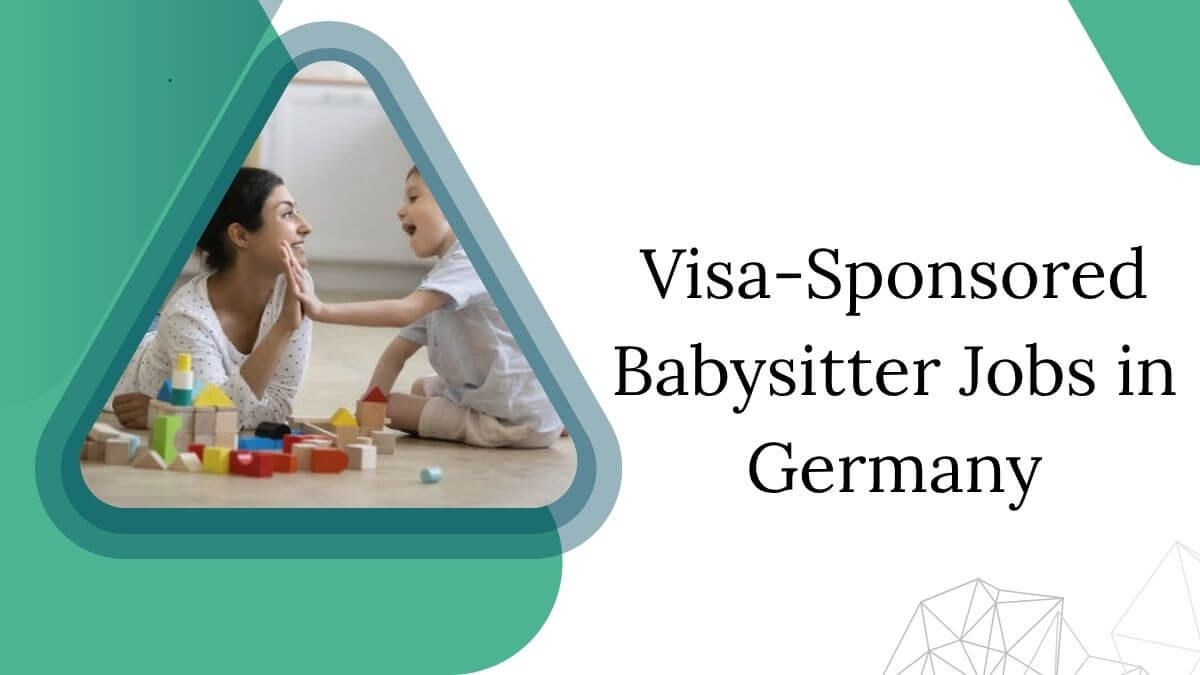Jobs for Babysitters in Germany with Sponsored Visas: In our hectic culture, more and more people are searching for trustworthy childcare services. In Germany, like in many other countries, guardians frequently need trustworthy and capable sitters or housekeepers to watch their children.
This article delves deeply into the fascinating realm of child care and caregiving in Germany. The fact that visa sponsorship is an option is made obvious, which adds to the allure of this career path for those who enjoy working with youngsters.
Need for Babysitters:
Germany has seen significant changes in working conditions over the years, despite the country’s unexpected economic expansion. Since more guardians will be working, there will be a plethora of needs for childcare providers, such as sitters and caregivers.
Key Points:
- Employment nation: Germany
- Employment sort: Nanny/babysitter
- Employment necessity: Least of five years
- Education required: Essential English
- Employment age: Any
- Monthly Compensation: EUR 1200 – 1600
- Employment Term: Full-Time and Permanent
Check More: Latest English-Speaking Jobs in Germany
Requirements:
- Verify that the work satisfies all legal requirements and includes information on living options, pay, and working hours.
- Apply for a work visa at the German department or international haven in your home country. You must have a genuine business proposition, proof of your expertise, and accompanying documentation.
- Get health insurance that covers you in Germany. typically a must for obtaining a work visa.
- Make arrangements to provide the necessary paperwork because some employers could want a criminal background check.
- Although it’s not always necessary, knowing the basics of German can be helpful, especially for everyday interactions and family communication.
- Possessing significant childcare skills, such a degree or certificate, will strengthen your candidacy.
- Give evidence of your intended stay in Germany. This might be a letter from the family outlining your settlement arrangements or a leasing agreement.
- The show only has enough stores to meet your initial expenses in Germany, and you started receiving a wage not long after.
- Make arrangements to pay the application fee for a visa.
Tasks Performed by a Babysitter:
- Arrange the child’s social activities, like karate classes, swimming lessons, and trips to the stop, and keep an eye on their development.
- In a similar vein, you want to see how the children use their intuition with strangers while their parents aren’t around.
- Maintain a healthy atmosphere around your home.
- Keep an eye on your kids’ daily activities and well-being.
- Not much cleaning to do, just a few quick errands.
- Children are taught English through homework and leisure activities.
- Assist kids in improving their English.
- Make sure the kids are motivated and mentally well.
Benefits of Jobs:
- Legal Employment with a German Work Visa Sponsored by Employer: Babysitter jobs come with full visa support, allowing you to work legally in Germany under an official employment contract.
- Opportunity to Work in One of Europe’s Safest and Most Developed Countries: Germany offers a secure and high-quality living environment, especially for women working in caregiving roles.
- Attractive Monthly Salary with Additional Perks: Babysitters typically receive a stable monthly salary along with benefits like free meals, bonuses, and paid time off.
- No High Education or Advanced Experience Required: Many positions only require basic education and childcare experience, making it accessible to a wider range of international applicants.
- Free or Subsidized Accommodation with Host Families or Employers: Most employers provide private or shared living arrangements, helping reduce your housing expenses significantly.
- Free Meals During Working Hours Provided by Families: Babysitters often receive free home-cooked meals daily, which helps cut down on grocery costs.
- Health Insurance and Medical Care Covered Under German Law: Employers ensure you are enrolled in health insurance plans that provide access to doctors, hospitals, and emergency care.
- Work-Life Balance with Regulated Working Hours: Babysitting jobs in Germany typically offer part-time or full-time hours with clear limits and scheduled breaks.
- Paid Holidays and Sick Leave as Per German Labor Standards: You are entitled to annual leave and paid sick days, ensuring job security during emergencies or rest time.
- Learn German Language and Culture Through Daily Interaction: Working with local families gives you the chance to strengthen your German language skills and adapt to a new cultural environment.
- Multicultural and Inclusive Work Atmosphere: Germany is home to a diverse population, and many employers are respectful, inclusive, and supportive of international staff.
- Possibility to Extend a Contract or Switch to Other Care Roles: After completing one contract, many babysitters transition to nanny, au pair, or elderly care roles within Germany or Europe.
- Legal Right to Reside and Travel in Schengen Countries: With a German work visa, you may also travel freely to other Schengen countries during your stay.
- Enhance Your Resume with European Work Experience: Gaining international experience in Germany fortifies your CV and creates opportunities for future employment overseas.
- Pathway to Long-Term Settlement or Residence Permit in Germany: Long-term workers may be eligible to apply for residence permits or PR options after meeting legal requirements.
Salary for Babysitters:
In Germany, pay for nannies or caregivers might vary depending on factors like experience, location, and specific job requirements. Hourly prices typically range from €25.00-30.00. The boss’s willingness to assist with the necessary paperwork may determine whether or not they sponsor a visa. It’s appropriate to inquire with possible employers or use job boards to find jobs that support visas for caretaker or sitter roles in Germany.
How to Apply for Visa-Sponsored Babysitter Jobs in Germany?
- Through websites, online job portals, or local childcare placement agencies, search for sitter or caretaker jobs in Germany.
- Write a thorough follow-up that emphasizes your experience, skills, and any noteworthy childcare credentials. If at all possible, include references from previous employers.
Frequently Asked Questions:
Can I get a visa-sponsored babysitter job in Germany?
Yes, many families and agencies in Germany sponsor visas for babysitters or au pairs, especially if there’s a shortage of local caregivers. Sponsorship is often linked to the Au Pair visa or work visa for caregivers.
Do I need to speak German to work as a babysitter in Germany?
Basic German is usually required, especially to communicate with children and parents. However, some international families may prefer English-speaking babysitters.
What are the basic requirements for getting a babysitter or au pair job in Germany?
You typically need to be 18–26 years old, have basic German skills, and meet health and background check requirements. For work-based babysitting (not au pair), relevant experience and possibly a child care certification are helpful.






